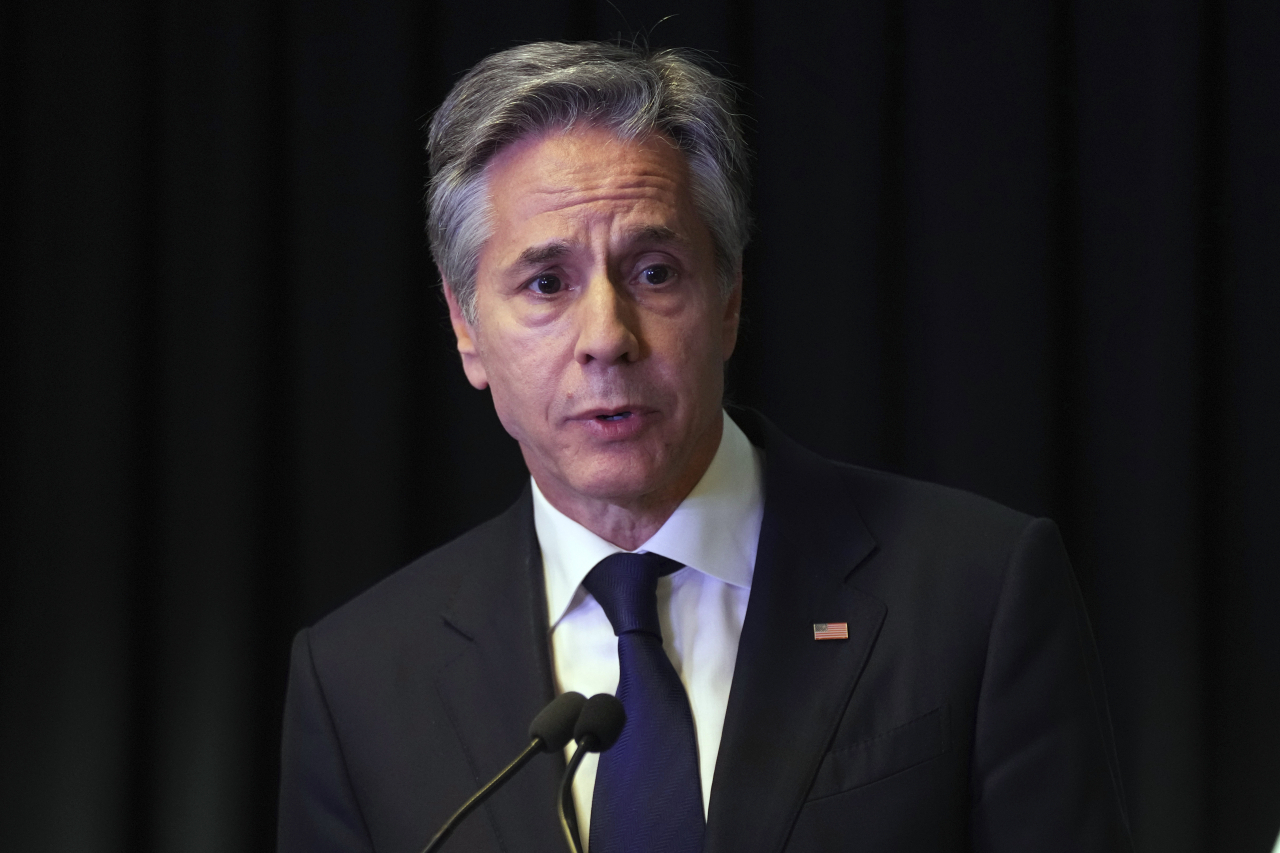Blinken calls on China to press N. Korea to end its 'dangerous' behavior
By YonhapPublished : April 27, 2024 - 10:33

US Secretary of State Antony Blinken said Friday that he renewed calls for China to exert its influence to press North Korea to cease its "dangerous" activities and return to dialogue during his talks with top Chinese officials in Beijing.
Blinken made the remarks during a press conference after he had separate meetings with Chinese President Xi Jinping, Foreign Minister Wang Yi, Minister of Public Security Wang Xiaohong and other officials in the Chinese capital on the day.
The secretary's trip to Shanghai and Beijing from Wednesday to Friday came as Washington has been pushing for its drive to "responsibly" manage the Sino-US relationship despite a hardening rivalry over technological leadership, maritime security, trade and other domains.
"I encouraged China to use its influence to discourage Iran and its proxies from expanding the conflict in the Middle East, and to press Pyongyang to end its dangerous behavior and engage in dialogue," Blinken said. "Going forward, we will have high-level discussions on these and other issues."
Pyongyang has been ratcheting up tensions with recent menacing weapons tests, including a "super-large" warhead power test for a strategic cruise missile and the launch of an intermediate-range missile tipped with a hypersonic warhead.
Blinken restated America's "enduring" commitment to the "complete" denuclearization of the Korean Peninsula while in Beijing, according to Matthew Miller, the spokesperson for the State Department.
During talks with Beijing officials, the secretary also highlighted Washington's "serious" concerns about China's commercial support for Russia's defense industrial base, which the secretary said is "powering Russia's brutal war of aggression against Ukraine."
"China is the top supplier of machine tools, microelectronics, nitrocellulose -- which is critical to making munitions and rocket propellants, and other dual-use items that Moscow is using to ramp up its defense industrial base, a defense industrial base that is churning out rockets, drones, tanks, and other weapons that President Putin is using to invade a sovereign country, to demolish its power grid and other civilian infrastructure, to kill innocent children, women and men," he said.
"Russia would struggle to sustain its assault on Ukraine without China's support," he added.
Moreover, the top US diplomat touched on the issue of China's overcapacity.
"I also expressed our concern about the PRC's unfair trade practices and the potential consequences of industrial overcapacity to global and US markets, especially in a number of key industries that will drive the 21st century economy, like solar panels, electric vehicles, and the batteries that power them," he said. PRC stands for China's official name, the People's Republic of China.
"China alone is producing more than 100 percent of global demand for these products, flooding markets, undermining competition, putting at risk livelihoods and businesses around the world."
Blinken also underlined a US focus on taking "necessary" actions to prevent "advanced US technologies from being used to undermine our national security and economy without unduly limiting trade or investment," according to Miller.
But both sides reaffirmed the importance of maintaining open lines of communication "at all times" and agreed to continued high-level diplomacy and interactions going forward, according to Miller.
During his talks with the top US diplomat, the Chinese president said that the US and China should be "partners rather than rivals."
"The two countries should help each other succeed rather than hurt each other, seek common ground and reserve differences rather than engage in vicious competition, and honor words with actions rather than say one thing but do the opposite," Xi said according to a transcript released by the State Department.
Xi underlined his three "overarching principles": mutual respect, peaceful coexistence, and willing cooperation.
"At present, transformation not seen in a century is unfolding in a profound way, and the international situation is fluid and turbulent," he said. "It is the shared desire of both the two peoples and the international community to see China and the US strengthen dialogue, manage differences, and advance cooperation."
Xi also said that China is happy to see the United States being "confident, open, prosperous, and thriving."
"We hope the US can also look at China's development in a positive light," he said. "This is a fundamental issue that must be addressed, just like the first button of a shirt that must be put right in order for the China-US relationship to truly stabilize, improve, and move forward."
Blinken reaffirmed the US' commitment to stably manage relations with China.
"We are committed to maintaining and strengthening the lines of communication between us to advance that agenda and, again, to deal responsibly with our differences so that we avoid any miscommunications, any misperceptions, any miscalculations," he said.
Blinken was referring to the agenda for bilateral cooperation that President Joe Biden and Xi set during their high-profile summit in California in November. At the summit, they agreed to restore military-to-military communication and cooperate on counternarcotics among other outcomes. (Yonhap)






![[KH Explains] Can tech firms' AI alliances take on Nvidia?](http://res.heraldm.com/phpwas/restmb_idxmake.php?idx=644&simg=/content/image/2024/05/07/20240507050619_0.jpg&u=)


![[Grace Kao, Meera Choi] Has money displaced romance on dates?](http://res.heraldm.com/phpwas/restmb_idxmake.php?idx=644&simg=/content/image/2024/05/06/20240506050233_0.jpg&u=)








![[K-pop’s dilemma] Time, profit pressures work against originality](http://res.heraldm.com/phpwas/restmb_idxmake.php?idx=652&simg=/content/image/2024/05/08/20240508050705_0.jpg&u=20240508171126)
![[Today’s K-pop] NCT Dream to drop pre-release from 2nd Japan single](http://res.heraldm.com/phpwas/restmb_idxmake.php?idx=642&simg=/content/image/2024/05/08/20240508050725_0.jpg&u=)